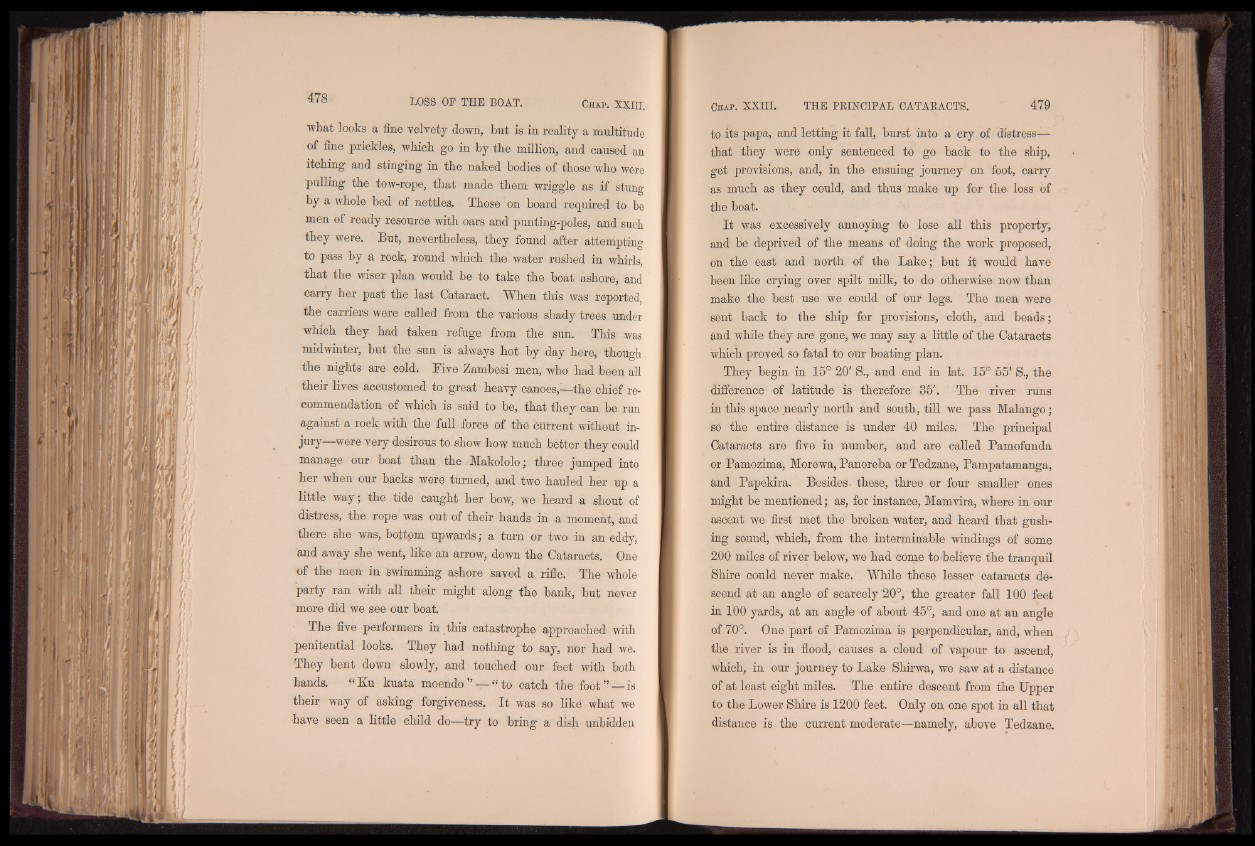
what looks a fine velvety down, but is in reality a multitude
of fine prickles, which go in by the million, and caused an
itching and stinging in the naked bodies of those who were
pulling the tow-rope, that made them wriggle as if stung
by a whole bed of nettles. Those on hoard required to he
men of ready resource with oars and punting-poles, and such
they were. But, nevertheless, they found after attempting
to pass by a rock, round which the water rushed in whirls,
that the wiser plan would be to take the boat ashore, and
carry her past the last Cataract. When this was reported,
the carriers were called from the various shady trees under
which they had taken refuge from the sun. This -was
midwinter, but the sun is always hot by day here, though
the nights are cold. Five Zambesi men, who had been all
their lives accustomed to great heavy canoes,-—the chief recommendation
of which is said to be, that they can be run
against a rock with the full force of the current without injury—
were very desirous to show, how much better they could
manage our boat than the Makololo; three jumped into
her when our backs were turned, and two hauled her up a
little way; the tide caught her bow, we heard a shout of
distress, the rope was out of their hands in a moment, and
there she was, bottpm upwards; a turn or two in an eddy,
and away she went, like an arrow, down the Cataracts. One
of the men in swimming ashore saved a rifle. The whole
party ran with all their might along the bank, but never
more did we see our boat.
The five performers in this catastrophe approached with
penitential looks. They had nothing to say, nor had we.
They bent down slowly, and touched our feet with both
hands. “ Ku kuata moendo” — “ to catch the foot”—is
their way of asking forgiveness. I t was so like what we
have seen a little child do—try to bring a dish unbidden
to its papa, and letting it fall, burst into a cry of > distress—
that they were only sentenced to go back to the ship,
get provisions, and, in the ensuing journey on foot, carry
as much as they could, and thus make up for the loss of
the boat.
It was excessively annoying to lose all this property,
and be deprived of the means of doing the work proposed,
on the east and north of the Lake; but it would have
been like crying over spilt milk, to do otherwise now than
make the best use we could of our legs. The men were
sent back to the ship for provisions, cloth, and beads;
and while they are gone, we may say a little of the Cataracts
which proved so fatal to our boating plan.
They begin in 15° 20' S., and end in lat. 15° 55' S., the
difference of latitude is therefore 35'. The river runs
in this space nearly north and south, till we pass Malango;
so the entire distance is under 40 miles. The principal
Cataracts are five in number, and are called Pamofunda
or Pamozima, Morewa, Panoreba or Tedzane, Pampatamanga,
and Papekira. Besides- these, three or four smaller ones
might be mentioned; as, for instance, Mamvira, where in our
ascent we first met the broken water, and heard that gushing
sound, which, from the interminable windings of some
200 miles of river below, we had come to believe the tranquil
Shire could never make. While these lesser cataracts descend
at an angle of scarcely 20°, the greater fall 100 feet
in 100 yards, at an angle of about 45°, and one at an angle
of 70°. One part of Pamozima is perpendicular, and, when
the river is in flood, causes a cloud of vapour to ascend,
which, in our journey to Lake Shirwa, we saw at a distance
of at least eight miles. The entire descent from the Upper
to the Lower Shire is 1200 feet. Only on one spot in all that
distance is the current moderate—namely, above Tedzane.